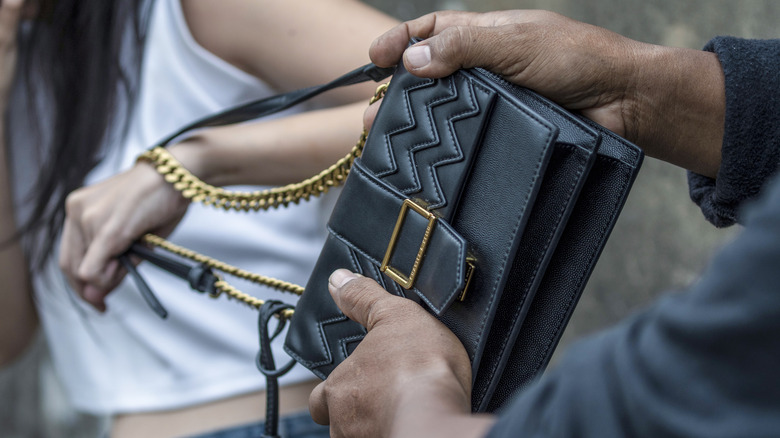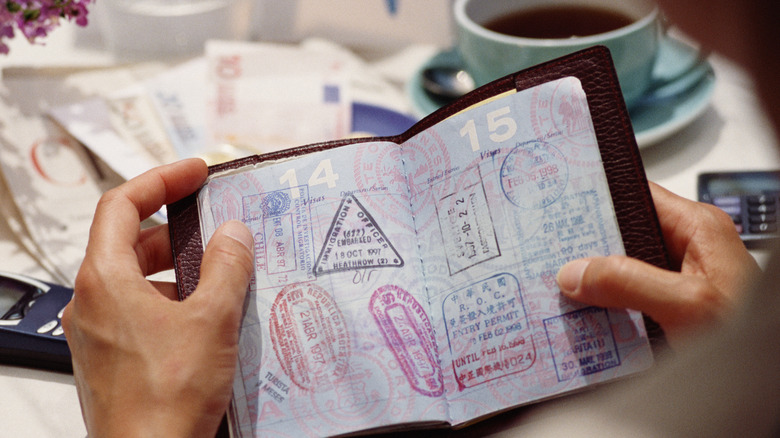Here's What To Do If You're Robbed While Traveling, According To Rick Steves
We do our best to take precautions when traveling, like wearing a money belt or a crossbody purse with cut-proof straps, leaving passports in the hotel safe, and even avoiding common taxi scams. However, no matter what you do, there is always a chance that you could be robbed while traveling. It happens to the best of us, and that includes travel pro Rick Steves, who has been pickpocketed in a few European cities. As Steves says on his website, "No matter how careful, any traveler can get ripped off or lose a bag."
While you may know what to do in America, the expert has some great advice for those of us traveling in Europe when it happens. This includes reporting the theft to the police, replacing your passport, canceling your credit cards (and maybe getting a replacement), and changing any travel plans that are affected by the theft.
However, the first thing he tells us is to remain calm. Panicking doesn't make anything easier, so keeping your wits about you is key. Plus, he says, "A positive attitude is a great asset." Take a moment, look around you, and assess what was taken. Then call the equivalent of 911. Steves helpfully lets us know that 112 is the European Union's emergency number, and it is 999 in the United Kingdom. The website for the U.S. Department of State offers a really helpful list of emergency numbers as well.
Preparing to travel and what to do first if you've been robbed
Steves recommends doing a few things before traveling, which can save you headaches later. "In the best situation, you've got easy-to-access copies of important documents (either photocopies or electronic backups)," he advises.That means prepping. Before you go on vacation, make copies of all your travel documents and email them to yourself in a password-protected document, so they can be retrieved, even if your phone is stolen. In the same file, have emergency numbers for the country or countries you'll be visiting, your bank's contact information (and download the app), credit card contact information, numbers for the U.S. embassy, hotel information, and numbers for friends who speak the language. The reason for that last one is that Steves suggests we ask people for help.
Hotel desks are a good spot to find English speakers, and try to learn the phrase "do you speak English" in the language of the area. If locals can't help, Steves says calling that friend may. You can also use the Google Translate app's live translation feature.
Call the police right away, as Steves reminds us that it may be necessary to have a report to replace documents and file an insurance claim. If your passport was stolen, this comes first. He says, "First, it's smart to report that your passport has been lost or stolen at travel.state.gov. To get a replacement, you'll need to go in person to the closest embassy or consulate (in the capital and sometimes major cities, too)." He also adds that you can call the consulate's U.S. Citizen Services office (dial +1 202 501 4444; in the US, call 888 407 4747), where they may be able to help with replacements.
Dealing with lost credit cards, travel plans, and money
Next, cancel your credit cards. If you do it within two days, Steves says you may only be responsible for up to $50. You can report them stolen over the phone or in the bank's app, though you'll have to verify your identity. You may be able to get replacement cards in two to three days in Europe, according to Steves, who adds, "Some may even be able to wire cash to keep you going or pay for your hotel room directly."
That brings us to money, and if your cards have been stolen, you're going to have to find a way to pay for your replacement passport, travel changes, new rail passes (those can only be replaced if they're online or printed from a computer), and new prescriptions if you had any stolen (keep a copy of your prescriptions in that documents folder.) You have two options. First, Steves recommends having someone wire you money from home. He mentions Western Union, which has high fees, but can get money to you in a few minutes. You may also be given a "repatriation loan" by the consulate.
"Usually this is enough money to cover a night's lodging and a plane ticket home. Your passport will be stamped 'Valid for Return to US Only' until your loan is repaid," Steves explains. However, be warned, as he adds, "If this happens to you, don't even think about stiffing Uncle Sam — after six months, the State Department forwards the paperwork to the Treasury Department and the IRS." Finally, call your rental car company for a replacement key if needed, though you're in for a fee, and make sure to call your phone service provider to "locate, lock, and wipe" your phone.


